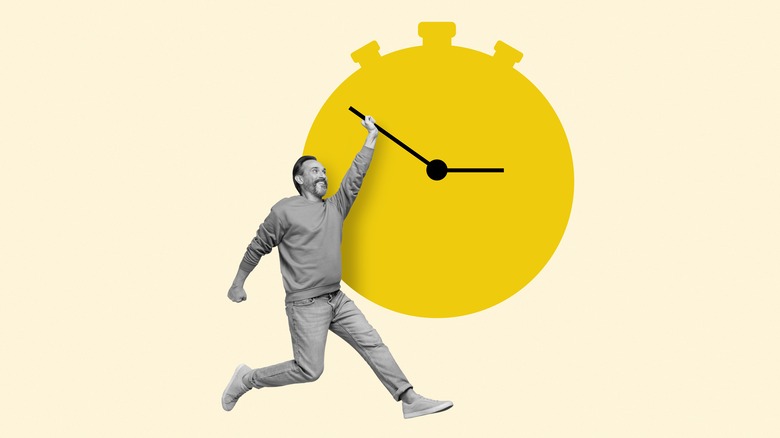How Your Personality Can Change As You Age
If a stranger asked your loved ones to describe you, what do you think they would say? Maybe they would say that you're caring, funny, smart, or even a little stubborn at times. Your personality is part of what makes you "you," and it's likely one of the most interesting and unique parts about you. Despite there being billions of other people in the world, there's no one exactly like you. While it isn't easy for researchers to fully grasp the concept due to its intangible nature, there have been many attempts to understand certain aspects of personality and how it impacts human behavior.
As described by The Personality Project, someone's "personality" is believed to be made up of a collection of feelings, thoughts, desires, and actions. Therefore, the study of personality involves analyzing how people feel, what they think, what they want, and how these factors ultimately influence their behavior. One popular model that psychologists use to measure personality traits is collectively known as "The Big 5," reports Psychology Today. Among these traits are openness, conscientiousness, extroversion, agreeableness, and neuroticism. HEXACO, a newer, revised model, includes honesty-humility as an additional trait.
As simple as it would be to categorize personality traits, some aspects of personality may be more nuanced and unable to be put in a box. For instance, if someone has a certain personality trait, is it possible for this trait to change over time? Research has been conducted in an attempt to answer this fascinating question.
Is personality fixed or changeable?
If you or someone you know has an undesirable personality trait, you may wonder how likely it is for a substantial change to happen. According to the University of California, personality traits can be malleable if they are spotted at the right age and if someone is committed to change. Therefore, while it's possible that personality traits can be changed, it may not be easy to change them without effort. As further explained by Psychology Today, consistency and sustained effort over a matter of many weeks may be required for someone to successfully change their behavior. Additionally, research suggests that attending therapy can help someone change aspects of their personality, particularly if they score higher on the trait of neuroticism.
Some researchers also believe that life transitions and new social roles can affect personality traits, such as getting married or changing careers. It was discovered in a 2017 study published in Developmental Psychology that the newlyweds' Big 5 personality traits appeared to change significantly during the first year-and-a-half of marriage. The newlywed wives showed declines in openness, agreeableness, and neuroticism, whereas the husbands displayed lower levels of agreeableness and extroversion and increased conscientiousness. In the study, marital satisfaction was thought to be a significant factor associated with these notable changes in personality.
How does your personality change as you get older?
As people age, their personalities may shift in accordance with their ever-changing life experiences. As a 70-year-old, there is a high probability that you'll no longer be the exact same person that you were 50 years ago, but why is this so?
Personality traits may seem fixed in the short term, but they may actually gradually change as the years go on. Brent Roberts, a psychologist at the University of Illinois, tells Live Science that this adjustment in someone's personality is subtle and not easily detectable in a short time frame of five to 10 years. Instead, it becomes increasingly pronounced over the long term. Psychologists refer to this evolution as "the maturity principle," and note that these changes in personality are usually for the better. For example, Dr. Sanjay Srivastava and his team discovered that participants in their study showed increased agreeableness during their 30s that continued to remain throughout their 60s, as described by the American Psychological Association.
Some additional positive changes that can be observed with age are an increase in self-confidence, conscientiousness, and emotional stability, as further discussed by PsychCentral. We may also benefit from these worthwhile traits when it comes to our professional life, our relationships, and our health, as they can improve our functionality in all areas of life.



